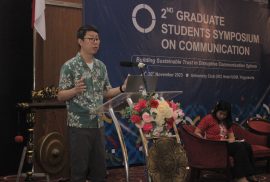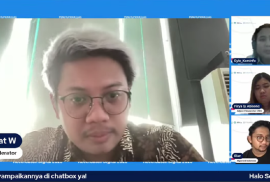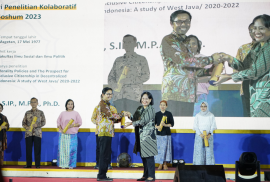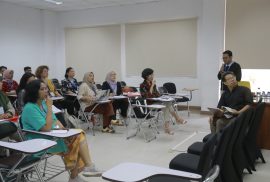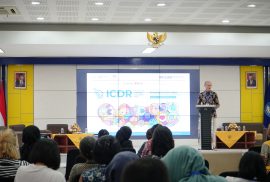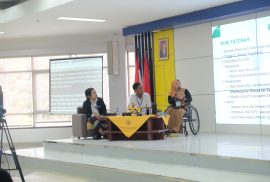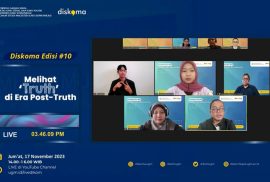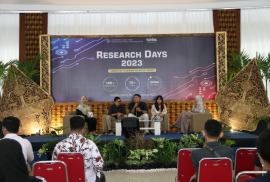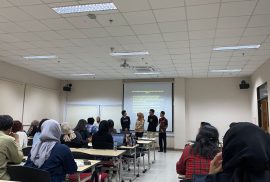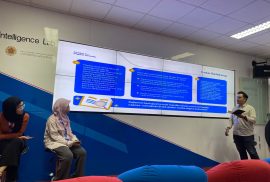Yogyakarta, November 29th 2023─The impact of technological disruption and the development of digital media, especially in the post-Covid-19 pandemic, has created significant changes in the public space. These changes do not only occur in the space of human interaction, but also disrupt the trust that exists between various entities in the public space. Responding to these changes, the Communication Masters Study Program at Faculty of Social and Political Sciences UGM again held its second Graduate Symposium on Communication (GSSC) on Wednesday to Thursday (29-30/11) at the University Club Hotel UGM with the theme “Building Sustainable Trust in the Disruptive Communication Sphere”.
Yogyakarta, November 27th 2023─Digital transformation has a significant impact on all sectors of life in every element of society, including employment. The demand for prospective workers by the industrial world must certainly be accompanied by an increase in the quality of digital talent in order to create an inclusive work landscape. Responding to this phenomenon, the Center for Digital Society UGM, the Ministry of Communication and Information, Siberkreasi, and the Ministry of Education and Culture of the Republic of Indonesia, have re-presented the Digital Intelligence Course in 2023.
Yogyakarta, November 27th 2023─Perseverance and commitment in building academic collaboration brought the Dean of the Faculty of Social and Political Sciences, Dr. Wawan Mas’udi, S.IP., MPA to receive an award in the Collaborative Research Category of the Soshum Cluster 2023. The appreciation was given at the Awarding Night for Outstanding UGM Personnel in 2023 on Wednesday (11/15).
The UGM Achievement Award Night is an annual event organized to give appreciation to alumni, lecturers, education staff, and students. Various categories for the four clusters, namely science and technology, social science, agrocomplex, and health are given to selected academicians who have produced their best work. This year, Dr. Wawan won the award with a research work entitled “Morality Policies and the Prospect for Inclusive Citizenship in Decentralized Indonesia: A Study of West Java”. The award is certainly a proud achievement as well as an encouragement to continue producing academic works in the social and political fields.
Yogyakarta, November 22nd 2023─The media plays a central role in influencing and shaping people’s perceptions of the world and the things in it. Therefore, it is important for the media to provide a fair and inclusive representation of various issues and parties, including disability issues. Responding to the importance of discussing media issues and their relation to disability issues, the topic was also raised in one of the panel sessions of the International Conference on Disability Rights (ICDR) held on Wednesday (22/11) at Faculty of Social and Political Sciences UGM. Hosted by Budi Irawanto, Lecturer of Faculty of Social and Political Sciences UGM, the 1D panel session with the theme “Communication in Media” was attended by five presenters representing various universities and organizations.
Yogyakarta, November 22nd 2023—In the third year of the International Conference of Disability Rights (ICDR), the Faculty of Social and Political Sciences UGM was selected as the host. This annual conference is organized by the Australia-Indonesia Disability Research and Advocacy Network (AIDRAN) forum in collaboration with Fisipol UGM and the Australian Catholic University. Taking place over three days, namely 21-23 November 2023, experts, activists and academics gathered to discuss disability rights in a society that has not been fully accommodated.
Yogyakarta, November 22nd 2023─The agenda for implementing inclusivity is designed by involving all elements, from the community to the government. The village as the unit closest to the community occupies a crucial position to build this joint commitment. Unfortunately, the village culture, which is mostly built on conservative culture, is still unable to accept the existence of people with disabilities. Negative stigma, unaccommodated limitations, and violence are still problems that make disabled people discriminated against.
Yogyakarta, November 17th 2023─The massive development of media today is intertwined with media conglomerations where media owners have the power to create news framing and determine the direction of content distributed. As a result, the veracity of information is now at stake. As a series of events to welcome the 2023 Graduate Students Symposium on Communication Science (GSSC), the Diskusi Komunikasi Mahasiswa (Diskoma) held a webinar entitled “Seeing ‘Truth’ in the Post-Truth Era” on Friday (17/11) online via Zoom Meeting and YouTube Live – UGM Department of Communication Sciences. This discussion also supports SDGs goal point 16 regarding peace, justice, and institutions.
Yogyakarta, November 17th 2023─Policies that are discriminatory and exclusive are still often found in several regions in Indonesia. In response to this, the Faculty of Social and Political Sciences, Gadjah Mada University conducted research entitled “Morality Policies/Politics and the Prospect for Inclusive Citizenship in Decentralized Indonesia: A Study of West Java” in collaboration with the Australia-Indonesia Partnership Towards an Inclusive Society (INKLUSI) and consisting of Wawan Mas;udi, Dean of Fisipol UGM; Erwan Purwanto; Ayu Rahmawati; Ulya Jamson; and Fuji Prastowo. The choice of West Java Province as the focus of this research was not without reason. “West Java (cities) have repeatedly been included in the intolerant index and have the highest number of reported cases of discrimination,” explained Ayu Rahmawati at the Research Days event held on Friday (17/11).
Creating an inclusive and friendly environment for people with disabilities is a manifestation of the mandate contained in Undang-Undang Nomor 8 Tahun 2016 concerning People with Disabilities. Responding to this mandate and the increasing discourse regarding inclusivity, the Faculty of Social and Political Sciences, Gadjah Mada University (Fisipol UGM) is preparing to become an inclusive campus. This was conveyed by Nurhadi Susanto, Deputy Dean for Finance; Asset; and Human Resources.
Nurhadi said that currently, various efforts have been made by Fisipol UGM to support the realization of an inclusive campus. One of the main aspects that should be highlighted is efforts to rehabilitate and improve campus infrastructure which is still not accommodating enough for people with disabilities. Development of disability-friendly infrastructure at Fisipol UGM includes the installation of guiding blocks, ramps, and handrails or handrails in elevators. In addition, plans to improve the accessibility of toilet facilities that are less accommodating for wheelchair users are also being pursued. “Fisipol is very enthusiastic and committed to investing in disabled-friendly facilities,” stressed Nurhadi. To ensure that the development process is appropriate and appropriate, Fisipol also involves friends with disabilities to monitor and evaluate the planning process, implementation, and use.
Yogyakarta, November 14th 2023─Responding to the important role of the media in welcoming elections, the Center for Digital Society (CfDS) FISIPOL UGM looks at the sentiment of the national media towards presidential candidates ahead of the 2024 elections through research entitled “The Role of Media in the Election Period”. The study was conducted by M. Perdana Sasmita-Jati Karim, Irbah Asfarina, and Emira Anjani (CfDS UGM Research Team) to see the tendency of digital media in publishing articles against one or two parties towards Indonesia’s political party year.

